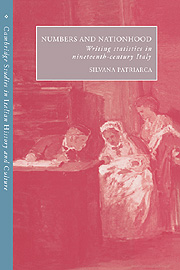Book contents
- Frontmatter
- Contents
- List of illustrations
- Acknowledgments
- Map 1 Italy during the process of unification
- 1 Introduction
- 2 A science for the “civilizing” of nations
- 3 The logics of statistical description
- 4 Official numbers
- 5 “Patriotic” statistics
- 6 The identity of the Italians
- 7 A map of the new nation
- 8 Center and periphery
- 9 Epilogue
- Appendix: Numbers of statistical publications
- Select bibliography
- Index
8 - Center and periphery
Published online by Cambridge University Press: 14 October 2009
- Frontmatter
- Contents
- List of illustrations
- Acknowledgments
- Map 1 Italy during the process of unification
- 1 Introduction
- 2 A science for the “civilizing” of nations
- 3 The logics of statistical description
- 4 Official numbers
- 5 “Patriotic” statistics
- 6 The identity of the Italians
- 7 A map of the new nation
- 8 Center and periphery
- 9 Epilogue
- Appendix: Numbers of statistical publications
- Select bibliography
- Index
Summary
The previous chapter has shown how statisticians tended to downplay the grid of the urban and rural communes in favor of those all-powerful territorial units of reporting, the compartimenti. The role and performance of communes was however the center of attention of both politicians and state statisticians in the early phase of construction of the new nation. At the root of the discussion on the morphology of communes stood the larger issue of the difficult articulation between national and local elites, central state, and local government. The making of a liberal order required the spread of its institutions across the national territory. It was not only a matter of establishing representatives of state authority in all its peripheral offices, but also of favoring the establishment of the structures of a modern society by insuring the proper working of local government. A great responsibility fell on the local organs of government, as the legislation concerning the administrative organization of the new state assigned to communes more functions and resources than they had usually had in the former states. Communes came to enjoy a considerable autonomy in the imposition of taxes and the employment of their revenues. Distrusting the loyalty and skills of locally elected bodies, members of the state apparatus looked on this autonomy with concern and resisted demands to extend it.
- Type
- Chapter
- Information
- Numbers and NationhoodWriting Statistics in Nineteenth-Century Italy, pp. 210 - 232Publisher: Cambridge University PressPrint publication year: 1996

